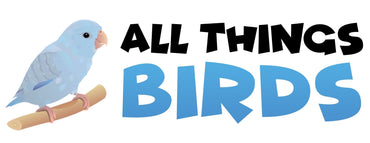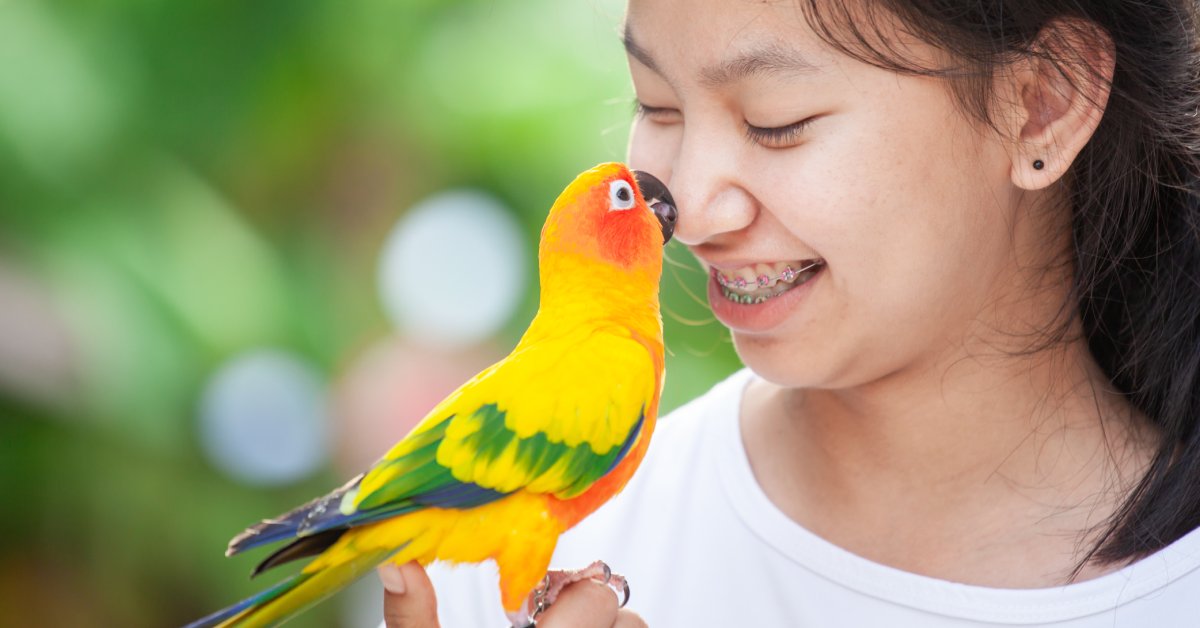Your once-quiet home is about to burst to life with cheerful chirps and sweet songs from your new feathered friend! You’re so excited to welcome them into your home and your heart—at the same time, you’re a little nervous. You’re new to bird care and want to give your pet bird the best life possible. Where do you begin?
Caring for a bird is a big responsibility, and it’s important to learn the basics of bird care before bringing one home. Whether you have a parakeet, cockatiel, or a large bird like a conure or macaw, these tips will help you provide your avian friend with the love and care they deserve!
Understanding Your Bird
No two birds are the same! They come in all shapes, sizes, and colors, and each has its own unique personality. Before you bring your new feathered friend home, look into their species. Find out what kind of food they eat, how much exercise they need, and what kind of environment they thrive in.
Creating a Safe Environment
Birds need a safe and secure living space. Their cage or aviary should be large enough for them to move around a bit. They’ll need even more room if their wings are not clipped. Line the bottom with newspaper or bird-safe bedding, and provide perches at varying heights for your bird to rest on.
Place the cage away from drafty windows or doors, as well as heat sources or direct sunlight. Birds are sensitive to temperature changes and can easily overheat or get cold. Also, be mindful of potential hazards in your home, such as toxic plants or other pets that may harm your bird.
Feeding Your Bird

Many new bird owners assume an all-seed diet is enough to keep their feathered friend healthy. This is because most pet stores sell it and most birds readily eat it. However, an all-seed diet isn’t balanced. It lacks essential vitamins and minerals, such as calcium, Vitamin A, and Vitamin D.
Although nutritional needs differ between species, you want to provide your pet bird with a varied diet that includes dry seed, sprouts, pellets, fruits and vegetables, nuts and legumes, safe table foods, and occasional treats like millet spray.
Dry Seed
While not the healthiest part of a bird’s diet, dry seed is still an important component. It contains fatty acids and oils that are necessary for a healthy coat, feather growth, and immune system. Keep in mind that dry seed is high in fat and low in other nutrients, so it should only make up a small part of their diet, unless your bird is a granivore like a parakeet or cockatiel.
Sprouts
Sprouted seeds are highly nutritious! They’re full of enzymes, vitamins, and minerals that are beneficial to your bird’s health. You can easily sprout your own seeds at home by soaking and rinsing a mix of grains and legumes, then allowing them to grow for three to five days. Popular seeds for sprouting include millet, lentils, wheat berries, and mung beans.
Pellets
Bird pellets are a manufactured food made from ground and compressed grains, seeds, fruits, and vegetables. They provide birds with the vitamins and minerals they need in their diet. Pellets come in different shapes, sizes, and colors according to species. Some birds are picky about their pellets, so it can take some trial and error before you find one that your bird loves.
Fruits and Vegetables
Just like humans, birds benefit from eating a variety of fresh fruits and vegetables. You can offer them leafy greens like spinach or kale; colorful veggies like carrot sticks or bell pepper slices; berries such as strawberries or blueberries; or small pieces of fruit like apples or oranges. Wash all produce thoroughly and remove seeds or pits that could be toxic to your bird.
Nuts and Legumes
Nuts and legumes are great sources of protein, fat, and other essential nutrients for your pet bird. Some popular options include almonds, peanuts, cashews, walnuts, sunflower seeds, chickpeas, and lentils. Give them in moderation, as they can be high in fat and calories.
Safe Table Foods
You may be surprised at how many common human foods are safe for birds! These include cooked chicken, eggs, pasta, rice, whole wheat bread and crackers, oatmeal, and popcorn (without butter or salt). Offer them in moderation, and avoid anything that contains added sugar, salt, or artificial flavors.
Occasional Treats
Treats should only make up a small portion of your bird’s diet. The occasional treat can keep things interesting and add variety to their meals! Some good options include millet spray (a popular treat for parakeets), whole nuts (in their shell), or dried apricots and figs.
Exercise and Enrichment

All birds need some form of physical activity to stay healthy and happy. Depending on the size and species, this can range from a daily flight around the room to climbing, swinging, and playing with toys. You can give your bird chewable toys, puzzles, and foraging toys to help them release energy.
Grooming
Birds groom themselves regularly, but they may also need some help from you. Keep their feathers clean and free of dust by giving them a bath or misting them with water once or twice a week. You should also keep an eye on your bird’s beak and nails. If they grow too long, take your bird to a veterinarian or a professional groomer who can trim them safely.
Bonding With Your Bird
Birds are social creatures that enjoy companionship. Interact with them by talking to them, singing to them, and offering treats from your hand (once they’ve grown accustomed to you). Every bird is different—some love physical contact, while others prefer more space. Learn and respect your bird’s preferences!
Regular Veterinary Care
It’s a sobering statistic, but many pet birds never see a vet in their lifetime, not even when they’re sick. Don’t be the owner who neglects their bird’s health! Find an avian veterinarian near you, and schedule regular check-ups for your feathered friend.
Vets can perform physical exams, blood tests, and fecal samples to check for underlying health issues. They can also provide important preventive care, such as wing clipping, beak trimming, and parasite prevention, and give advice on diet and behavior training.
Bird care doesn’t have to be complicated—some research and plenty of love can go a long way in providing your pet with a happy and healthy life. Use these tips as a starting point, and continue to learn and adapt as you get to know your feathered friend. With proper care and attention, your bird will bring joy and companionship into your life for many years. Depending on the species, it could be for the rest of your life!
At All Things Birds, we know that bringing home a new bird requires a lot of preparation. If you need toys, food, or other supplies for your new pet, check out our website for a wide selection of bird products. If you’re in the Santa Clarita area, we offer bird grooming services, along with boarding for when you’re away from home. Use us as a resource during your bird’s lifetime.

